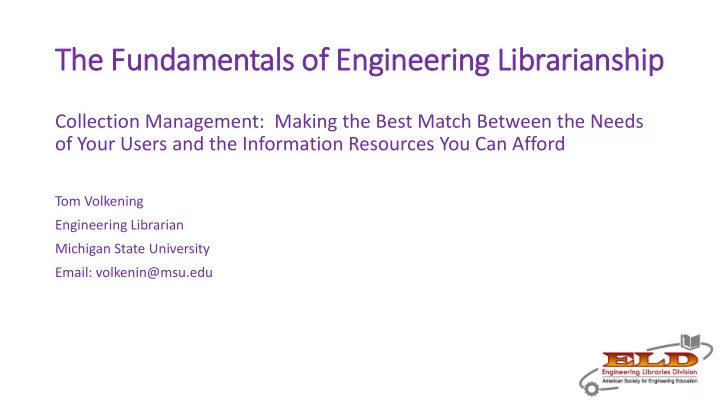

The Fundamentals of f Engineering Librarianship Collection Management: Making the Best Match Between the Needs of Your Users and the Information Resources You Can Afford Tom Volkening Engineering Librarian Michigan State University Email: volkenin@msu.edu
Where to Finds Relevant Articles COMPENDEX Library Literature & Information Science Library, Information Science & Technology Abstracts
Such As: Zhang, Li. Analyzing Citation and Research Collaboration Characteristics of Faculty in Aerospace, Civil and Environmental, Electrical and Computer, and Mechanical Engineering, COLLEGE & RESEARCH LIBRARIES , Volume 79, Issue 2, Page: 158-178, DOI: 10.5860/crl.79.2.158 This article investigates citation and research collaboration habits of faculty in four engineering departments
Acquisitions Approval Plans Patron Driven Acquisitions “Big Deals”/Package Deals Consortium deals Buying individuals titles
Is There Such a Thing as a Core Collection List Is there a “good” list of core titles to support engineering programs? Resources for College Libraries ? Does ABET require a core collection of engineering information resources?
Guides to the Literature Using the engineering literature / edited by Bonnie A. Osif., 2 nd ed. Boca Raton, FL : CRC Press, 2012 Many ELD members contributed chapters to this work.
Collection Development Policies Not easy to write or keep current but they can be useful Provides a broad description of a collection and can set guidelines for collecting such as: Collection priorities Collection strengths General parameters such as language preferences
How do I know what to buy? Faculty/Staff/Graduate Student Recommendations Book Reviews Information from departmental/college web sites on research priorities Research interests of individual faculty from their web sites Successful grant proposals Information from Interlibrary Loan Service about what items are being borrowed Citation Analysis
Print vs. Digital When asking for recommendations ask about print vs. digital Is there a digital version available? Expected level of usage? For digital how many users at what price? Are there DRM issues? Accessibility an important issue for e-resources
To Buy or Not to Buy Textbooks Very dependent on local policies Should a research library buy any introductory textbook? How about a library that is just supporting undergraduate programs? Engineering textbooks can be very expensive so should you buy textbooks that are being used for classes and put them on Reserve to save students money?
Standards and Codes Many organizations develop standards so no library can own or have access to all of the standards their users may need Often needed by only one person or a small group of people Some major standards organizations include, ASTM, ANSI, ISO ASTM standards probably the standards most used by engineers Some professional societies also develop and issue standards and codes, ASCE, ASME, IEEE, SAE Interlibrary Loan Services can sometimes borrow standards
Standards and Codes Cost for a subscription to all ANSI or ISO is very expensive so few if any libraries can afford them Individual standards can also be expensive Purchase on demand using deposit accounts with vendors such as: IHS Markit Standards Store and Techstreet
Industrial Codes Some Examples: National Electrical Safety Code ASME Boiler & Pressure Vessel Code
Building Codes International Code Council (ICC) is the main building code developer in the United State. In some states, the codes are adopted on a state-wide basis while in other states, the codes are adopted by individual jurisdictions. In some states, jurisdictions use other building codes and standards. Historical codes can be worth retaining The ICC provides free online public viewing of their recent standards and codes: https://codes.iccsafe.org/public/. The public access mode only allows viewing of the documents. It does not allow for downloading, bookmarking, coping or printing. Users can browse by category or select from a state map. Once a category is selected, users can click on the book cover icons of the available choices to see the text of the documents Some examples: International Building Code International Plumbing Code International Mechanical Code ICC A117.1-2017 Accessible and Usable Buildings & Facilitiesl
Specialized Building Codes Some Examples: NEHRP Recommended Seismic Provisions for New Buildings and Other Structures . Wind Provisions in the 2015 International Building Code International Wildland-Urban Interface Code
The Other Side of Collection Management Do you have any comprehensive collections where you want to keep everything? Should you withdraw print journal volumes if you have online access to them? Should you withdraw “dated” material such as “old” computer science materials Can I weed ebooks?
Recommend
More recommend